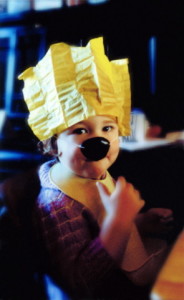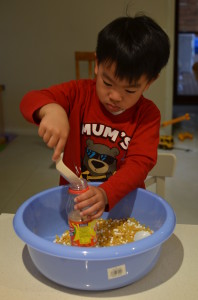 Wouldn’t it be nice to return to our childhood? Often it seems that all children do all day is play. And of course, they do! They flit from one activity to the next like busy little bees and always seem to be entertained or distracted with something. In a ‘First Steps’ course I attended recently, I heard a fantastic talk on ‘The role of play in the development of a child’. They emphasized how important play is for the wellbeing of children and how it contributes to their education in those early years before they enter school. Play also contributes enormously to psycho-motor development of children, which is the basis for adequate leaning that will continue through their life. Each different experience leads your child to acquiring various sets of skills. When our children play, they are learning about the world around them. Whether it is pretending to cook for a tea party or driving their imaginary car to the beach, they are exploring, investigating and discovering new things. Some days, when an empty box becomes my children’s hideaway castle from giants or my wooden floorboards suddenly become the ocean, I am amazed at their sense of imagination, creativity and adventure. For most children, imaginative play will come naturally. At times however, you may still need to encourage and stimulate your child’s creativity by helping them to visualize a scene or scenario to foster creative play. Playing can also help to build up children social skills. Initially, a child might be quite content to play on their own with inanimate objects as they practice interactive skills. Later with playmates however, they will learn important skills such as turn taking, sharing and practicing generosity with others. Some ways to stimulate play with your child:
Wouldn’t it be nice to return to our childhood? Often it seems that all children do all day is play. And of course, they do! They flit from one activity to the next like busy little bees and always seem to be entertained or distracted with something. In a ‘First Steps’ course I attended recently, I heard a fantastic talk on ‘The role of play in the development of a child’. They emphasized how important play is for the wellbeing of children and how it contributes to their education in those early years before they enter school. Play also contributes enormously to psycho-motor development of children, which is the basis for adequate leaning that will continue through their life. Each different experience leads your child to acquiring various sets of skills. When our children play, they are learning about the world around them. Whether it is pretending to cook for a tea party or driving their imaginary car to the beach, they are exploring, investigating and discovering new things. Some days, when an empty box becomes my children’s hideaway castle from giants or my wooden floorboards suddenly become the ocean, I am amazed at their sense of imagination, creativity and adventure. For most children, imaginative play will come naturally. At times however, you may still need to encourage and stimulate your child’s creativity by helping them to visualize a scene or scenario to foster creative play. Playing can also help to build up children social skills. Initially, a child might be quite content to play on their own with inanimate objects as they practice interactive skills. Later with playmates however, they will learn important skills such as turn taking, sharing and practicing generosity with others. Some ways to stimulate play with your child:
- Encourage physical activity
- Vary the environment
- Provide different toys
- Teach the child games
- Provide materials for pretend play
- Encourage, praise and support good play
 So how can we build and form character in our child just by watching them play? Watching your child is usually the first step to determine what their temperament is. Does he lose his temper easily? Does he persevere in finishing his activities and games? Such information is important in the ongoing forging of your child’s constitution as you can use this information to help the child improve in acquiring virtues. During play, you can also teach your children order, generosity, and build on their social skills with others. From time to time, encourage activities which test their perseverance and concentration. Of course examining and observing your child can only happen if you are with your child or watching them at play! One great tip to remember is:
So how can we build and form character in our child just by watching them play? Watching your child is usually the first step to determine what their temperament is. Does he lose his temper easily? Does he persevere in finishing his activities and games? Such information is important in the ongoing forging of your child’s constitution as you can use this information to help the child improve in acquiring virtues. During play, you can also teach your children order, generosity, and build on their social skills with others. From time to time, encourage activities which test their perseverance and concentration. Of course examining and observing your child can only happen if you are with your child or watching them at play! One great tip to remember is:
Play is more important than toys.
Growing up in the 90s, I remember having very little toys and most of them were homemade. I had a couple of special stickers and favourite knick knacks, but one of the best toys I ever had was a homemade dolls house, created mainly from cardboard with paper dolls. The quality time I spent painting and constructing it with my mum was that special memory for me! Although toys can certainly help children to play they are not an end, just a means. Besides, as children play, they create their own toys. Some of the most ‘fun’ games my children play are mainly made up to amuse themselves. Toys really do not have to come from the store. You can save lots of money by not having the newest gadgets and simply making your own. Simple things likes an empty cardboard box draped with a blanket can create heaps of fun for a child who will turn it into their imaginary castle or fort. A large tub filled with water usually provides endless fun when children get to pour and mix with plastic cups or containers. Another idea is a toy swap! Get a friend to fill a tub with toys that their kids no longer play with and swap it for another tub with you. Finally, try to limit screen time as much as possible! If your child is going to watch TV or use the computer, set some sensible limits and boundaries. So… let your children PLAY! Have fun with them and participate in their imaginary games and make believe world. You can never spend too much time with your child. Quality moments in those early years with your children can never ever be bought back, so take the time to enjoy them!
Originally posted 2014-08-13 22:30:41.
